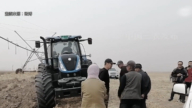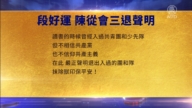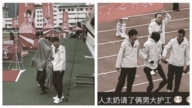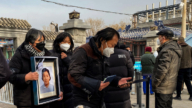【新唐人2013年07月08日讯】大陆一项官方数据显示,中国的城镇化率已经达到50%以上,但另有数据表明,有2亿多的城镇常住人口仍然是农村户口,他们在就业、教育、医疗、住房、社会保障等各方面,与真正的城镇户籍居民相差甚远。专家警告,这种大陆特有的“伪城镇化”现象,将有可能导致社会矛盾加大,甚至发生严重冲突。
据中共媒体报导,7月5号,“大陆市长协会”发布的2012年度《中国城市发展报告》显示,截至去年年底,中国城镇化率已达52.57%,显示全中国超过一半的人口,居住在城镇中。
但专家指出,这并不能说明更多的农业人口,已转化成了非农业人口,因为他们的户籍没有改变。
河南农民工张小猛:“进城打工的都是暂住啊﹗没有迁户口的。有的需要的话办个暂住证,有的暂住证都没办。”
一项由中国公安部统计的数据显示,大陆城市户籍人口不足35%,多达2亿6千万的城镇常住人口是农村户籍,他们依然无法享有和“城里人”同等的社会福利待遇。
中国经贸研究会特约研究员巩胜利:“中国的城镇化比较严峻,农村人口进了城市,表明上他是在这个城市或者城镇里面在生存着,但是他没有任何享受城镇化人口的待遇,包括医疗、保险、就业、失业,还有住房、教育。所以中国面临的问题就是人到了城镇,但是人的身份可能还在乡村。”
河南农民工张小猛:“城里的什么低保、社保肯定没有。5只要是农民身份的,福利待遇全部在农村。”
专家认为,中国大陆这种表面上人口转移造成的高增长“城镇化率”,并不能真实反映城镇化水平,充其量可以称其为“伪城镇化”。
“中国经贸研究会”特约研究员巩胜利,对目前大陆城镇化前景表示担忧。他指出,随着越来越多农村人口涌入城市,户籍制度造成的阶级地位不平等将会日渐突出,并将导致一系列社会问题。
巩胜利:“6中国今后的人口比例可能要达到10亿城镇化以上,就是还有3亿以上的农村人口。现在麻烦比较大,很简单,一句话,我是人,你是人,我们都是公民,但是我们公民的待遇不同。 比如说,中国最近几年,从湖北、贵州有些城镇发生了一些突发事件,就是这些人对政府处理农村的不满,所以才激起了一些包括游行示威﹗目前这样的事情在中国非常的多。”
有评论还指出,伴随大陆城镇化而来的另外一个问题,就是农村土地所有权的问题。一旦农民的户口性质发生了变化,原本拥有的土地就会失去,农民就会变得一文不名,从这个角度看,农村城市化的结果就是:农民被完全剥夺了财产,却没有享受到他们应得的待遇。
巩胜利:“他把这些农民的地收了以后,纳入到所谓的城镇居民,但是这些人去了城镇以后,怎么样生存下去,比如说,他有什么技能﹖你把他的地收了以后,他没有地种了,让他干什么? ”
大部分城镇户口的居民在网上表示,在他们眼中,城市户籍没有任何价值,不能像公务员一样买到低价的房产,也领取不到分文失业金,一样被上学难、治病难、养老难、就业难、住房难这“五座大山”压的喘不过气,相比之下,他们更羡慕农村人又有房子又有地。但有农民反驳说,农民进城就是因为种地收益低的可怜,甚至难以度日,现在连房子都被强拆、土地被强占。
网民哀叹:同处在大陆社会最底层的人们,无论在城市还是农村,结果都是一样的“被剥削”。
采访编辑/张天宇 后制/葛雷
China’s Fake Urbanization: Over 200 Million Remain Registered as “Rural Residents”
Recent official statistics show China’s urban population
ratio has exceeded 50%.
However, among these urban residents, over 200 million
are still listed with rural status on their household registration (hukou).
Because of this, they don’t get the same level of benefits
as urban residents with urban registration, such as
employment opportunities, education, healthcare,
housing and social security.
Experts warn that China’s unique phenomenon of
“fake urbanization” may intensify current social conflicts and result in serious clashes.
According to Chinese Communist Party (CCP)
mouthpiece media,
the Chinese Mayor Association released on July 5th
it’s annual report on China’s urban development for 2012.
It says that by the end of 2012,
China’s urban population ratio had reached 52.57%.
This shows that over half of China’s population
now lives in cities and towns.
Some experts commented that the statistics don’t show
clearly whether more of the farming population have
become part of the non-farming population,
as their household registration status has stayed listed as rural.
Zhang Xiaomeng, Henan peasant worker:
“Migrant workers are only temporary residents.
Our household registration status hasn’t changed.
To work in city, we need to apply
for a temporary residency permit.
Some of us haven’t even applied that permit yet.”
A survey by the CCP’s Ministry of Public Security shows that
only less than 35% of Chinese have a household
registration of urban status.
As many as 260 million urban residents are still legally part
of “rural population” as their household registration status.
Therefore they can’t share the same level of
social welfare as “real” urban people.
Gong Shengli, researcher at Chinese Seminar of
Economy and Trade: ”The situation of China’s urbanization process is pretty bad.
When rural people go to work in cities, they only live their
lives there but can’t enjoy any of the welfare of
real urbanized people in healthcare, insurance, employment
and unemployment benefits, housing and education.
So China’s problem is that when people move to cities
their legal identification remains in the countryside.”
Zhang Xiaomeng, Henan peasant worker: ”There is definitely
no basic living allowance or social security benefit for us.
As long as your identification is that of a peasant,
all welfare is subject to those of rural levels.”
Some experts say China’s rapid growth of urban
population from apparent migration cannot reflect the real level of urbanization.
At most it can only be called “fake urbanization”.
Gong Shengli, research fellow of Chinese Seminar
of Economy and Trade, says he worries about the future of China’s urbanization.
Gong says that with more rural people flowing into cities,
inequalities due to the household registration system
will become more and more prominent,
and this will lead to a number of social problems.
Gong Shengli: “In the future China’s urban population
may reach as many as one billion, with over 300 million people left in rural areas.
The current trouble is very simple but serious.
That is, both groups are humans and Chinese citizens,
yet one group gets treated so differently from the other.
For example, in the past several years some incidents
broke out in towns of Hubei and Guizhou.
The cause is exactly the grudge against the government
about how they treat rural people.
That’s why people demonstrated and protested.
Currently incidents like this happen often in China.”
Some analysis also points out another problem accompanied
with China’s urbanization process, which is the land ownership issue in rural areas.
Once a Chinese peasant changes his household registration
status, he will automatically lose his land, which is equivalent
to being deprived of one’s most important property.
From this point of view, during the urbanization process
peasants will lose their property but may not be compensated with urban welfare,
a system which itself is also badly corrupted.
Gong Shengli: “Let’s say that peasants hand in their land
and become so-called urban residents.
The problem is, how will they survive there?
For example, what skills do they have?
After you take their land, they will have no farming work to do.
What should they do in the future?”
On the other hand, many netizens of urban status claim that
in their opinions the urban status has no value at all, either.
They can’t purchase houses at low prices like government
employees; they get zero unemployment compensation;
and they are also oppressed by the “five big mountains”,
which are difficulties in attending school, seeing a doctor,
caring aged, finding a job and getting a house.
In contrast, urban residents even envy country people
because at least they have house and land.
However, rural people answer back that they move into cities
exactly because they earn too little to make a living;
and now, their houses or lands can be forcibly
demolished or occupied.
Netizens lament that the people in China’s lower class,
whether it’s those in the city or the country,
have no difference in being exploited by the CCP authorities.



























